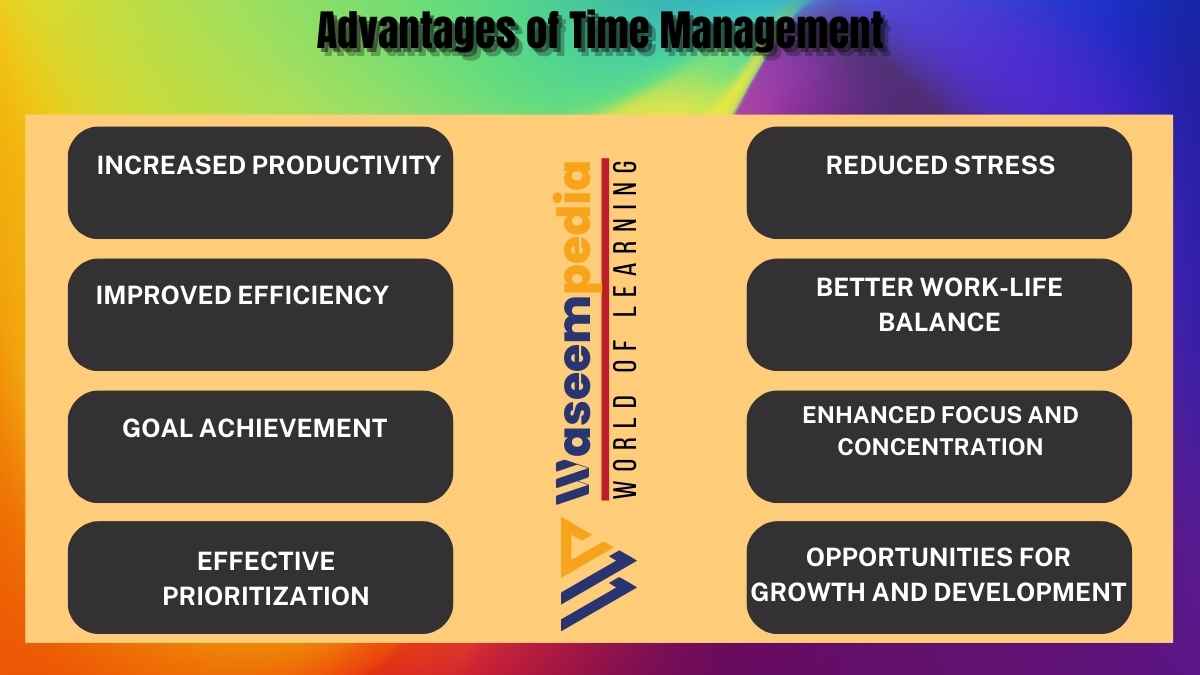Advantages of time management include increased productivity, reduced stress, improved decision-making, better work-life balance, and enhanced opportunities for personal and professional growth.
Time management is a valuable skill that offers numerous advantages in both personal and professional life. From increased productivity and reduced stress to improved decision-making and work-life balance, the benefits of effective time management are undeniable. By prioritizing tasks, staying organized, and making the most of available time, individuals can achieve their goals, maximize their potential, and lead happier, more fulfilling lives.
What is Time Management ?
Time management is the process of planning, organizing, and controlling how you allocate your time to specific activities and tasks. It is a crucial skill that allows individuals to make the most of their available time and achieve their goals effectively.
While mastering time management requires effort and discipline, the benefits it offers are numerous and significant.
9 Advantages of Time Management
There are many Advantages of Time Management But Waseempedia Explain the 9 Advantages of Time Management that are as given below
1. Increased Productivity
One of the most significant advantages of effective time management is increased productivity. By prioritizing tasks, setting deadlines, and allocating time efficiently, individuals can accomplish more in less time.
By focusing on high-priority tasks and minimizing distractions, time management enables individuals to work smarter, not harder, leading to greater productivity and accomplishment.
2. Reduced Stress and Anxiety
Poor time management often leads to stress and anxiety as individuals struggle to meet deadlines and juggle multiple responsibilities. Conversely, effective time management helps individuals stay organized and in control of their workload, reducing feelings of overwhelm and stress.
By breaking tasks into manageable chunks and scheduling time for relaxation and self-care, individuals can maintain a healthy work-life balance and reduce the negative impact of stress on their well-being.
3. Improved Decision-Making
Time management involves prioritizing tasks and making strategic decisions about how to allocate time and resources. This process enhances decision-making skills as individuals learn to evaluate tasks based on their importance and urgency. By focusing on high-value activities and eliminating time-wasting behaviors, individuals can make better-informed decisions that align with their goals and priorities.
4. Enhanced Focus and Concentration
Effective time management encourages individuals to concentrate fully on the task at hand, free from distractions and interruptions. By scheduling dedicated time blocks for specific activities and minimizing multitasking, individuals can enter a state of flow where they are fully immersed in their work.
This heightened focus improves the quality of work produced and enhances overall performance and efficiency.
5. Greater Opportunities for Learning and Growth
By managing their time effectively, individuals create opportunities for continuous learning and personal growth. By allocating time for skill development, education, and self-improvement, individuals can expand their knowledge base, acquire new skills, and advance their careers.
Time management enables individuals to invest in their long-term development, setting the stage for future success and fulfillment.
6. Improved Work-Life Balance
Balancing work commitments with personal and leisure activities is essential for overall well-being and happiness. Effective time management allows individuals to prioritize both professional and personal responsibilities, creating a sense of equilibrium and harmony in their lives.
By setting boundaries, managing workload effectively, and scheduling time for relaxation and recreation, individuals can enjoy a fulfilling work-life balance that promotes health, happiness, and fulfillment.
7. Enhanced Accountability and Responsibility
Time management fosters a sense of accountability and responsibility as individuals take ownership of their time and actions. By setting clear goals, establishing deadlines, and tracking progress, individuals hold themselves accountable for meeting objectives and achieving results.
This accountability cultivates a proactive mindset and empowers individuals to take control of their destiny, driving them towards success and fulfillment.
8. Improved Decision-Making
Time management involves prioritizing tasks and making strategic decisions about how to allocate time and resources. This process enhances decision-making skills as individuals learn to evaluate tasks based on their importance and urgency. By focusing on high-value activities and eliminating time-wasting behaviors, individuals can make better-informed decisions that align with their goals and priorities.
9. Enhanced Reputation and Credibility
Effective time management enhances an individual’s reputation and credibility both personally and professionally. By consistently delivering high-quality work in a timely manner, individuals earn the trust and respect of their peers, colleagues, and supervisors.
This positive reputation opens doors to new opportunities, enhances career advancement prospects, and builds lasting relationships based on reliability and integrity.

